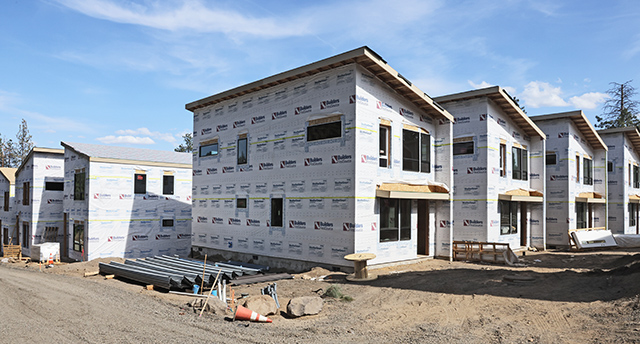Columbia will become Cessna — and stay here
Published 4:00 am Wednesday, November 28, 2007

- Jack Pelton, Cessna CEO
PORTLAND — The world’s largest manufacturer of general aviation planes prevailed Tuesday in its bid to buy Bend’s Columbia Aircraft Manufacturing Corp., one of Central Oregon’s largest employers, for $15.9 million in cash and the assumption of various liabilities, including customer deposits, warranties and payrolls. The purchase by Wichita, Kan.-based Cessna Aircraft Co., expected to close Dec. 4, totals roughly $26.4 million.
The acquisition means the Columbia manufacturing facility and all its products will soon bear the Cessna name, and the 430-person Bend plant is likely to increase hiring and production, according to Cessna CEO Jack Pelton.
“For Bend and (Columbia) employees, our purchase provides the stability that hasn’t been there,” Pelton said after the auction.
“With us, they are guaranteed a stable future.”
Cessna’s bid for Columbia, which filed for bankruptcy in September, was announced Tuesday morning in a packed courtroom at Portland’s U.S. Bankruptcy Court.
Cessna trumped opposing bidder, Melville, N.Y.-based Park Electrochemical Corp. When Columbia attorney Leon Simson announced the auction was over, a group of Columbia airplane owners cheered. Cessna has said it will honor Columbia warranties.
Pelton shook hands with Park President Brian Shore, both of whom announced their prospective bids.
Columbia representatives did not return calls for comment after the auction.
CEO Pelton’s plans
As soon as the auction concluded, Pelton said he was relieved to win the company he’s been courting since 2006. Pelton said the bid price was fair for Columbia’s high-quality, single-engine piston aircraft, which Pelton said fit nicely in Cessna’s existing product line, with little overlap.
With Cessna’s established worldwide distribution network and service centers, Pelton said Columbia products will get sales exposure they’ve lacked.
The decade-old Columbia plant will stay in Bend, Pelton added, and its 400-odd employees probably will maintain their seniority, accrued vacation time and other employee benefits. Conversion details are still being worked out, he said.
“That’s why we’re going to be (at the Bend plant today),” Pelton said. “We want to tell the employees that this is a continued employment. We want the people of Columbia to understand that we value them.”
In the past two years, Columbia employees have endured furloughs, layoffs and reduced hours. The employees currently are working 32-hour work weeks. Pelton said he intends to stabilize staff levels in the next 90 days.
“Our goal is to quickly market the plane aggressively,” he said, “ramping up the production rate.”
Cessna is heavily invested in developing new products, Pelton said. In the past 10 years, he said the company has created 25 new planes and products.
He sees Columbia as a new platform for that.
“We believe the company will be a stand-alone company in Bend,” he said. “We want to buy the product and the (people who) know how to produce these airplanes.”
Major investment
Pelton knows his company will have to invest in Columbia in order to make it profitable. At the hearing, Columbia attorneys said the company is losing $60,000 per day in operations.
“It will require a significant investment on our part,” Pelton said.
Cessna, which Columbia had said it favored as a buyer since filing for Chapter 11 bankruptcy Sept. 24, previously offered $14 million in cash and the assumption of roughly $10.5 million in liabilities, totaling $24.5 million. Park offered $15 million in cash and the assumption of unspecified liabilities on the bid deadline last week.
On Tuesday, Columbia attorneys said the company considered Park’s offer better for Columbia. From there, the auction continued with each side offering at least $200,000 above the previous price. After three rounds, Park declined to trump Cessna’s $15.9 million cash offer, $1.9 million above Cessna’s original bid.
DETAILS OF THE DEAL
What is Cessna?
Columbia’s road to Chapter 11
• Purchase price: $15.9 million in cash and the assumption of various liabilities. Total estimated purchase price: $26.4 million.
• Bend plant and employees: Columbia’s roughly 400 employees are expected to remain, with employment and production ramping up.
• Future for Columbia products: Bend will be one of six Cessna manufacturing facilities. Cessna intends to rename the current Columbia product line as the Cessna 350 and the Cessna 400. It also will integrate sales, parts supply and support of the former Columbia aircraft with its network of authorized dealers and service centers.
Cessna Aircraft Co. is the world’s largest general aviation aircraft manufacturer in terms of annual unit sales and is based in Wichita, Kan. The company was founded 80 years ago and has manufacturing facilities in Wichita, Kan.; Independence, Kan.; and Columbus, Ga. The company employs 9,500 people worldwide, according to its Web site.
Cessna makes aluminum planes that range from single-engine piston aircraft to turboprops to Citation business jets and is developing a next-generation piston airplane that will be made of composite materials. Its 2006 revenues totaled $4.2 billion and the company delivered more than 1,200 planes. Its revenues for the first half of 2007 were more than $2.1 billion.
Cessna’s parent company is Textron Inc., based in Providence, R.I. Textron produces Bell helicopters and has industrial and finance divisions. It also makes E-Z-Go golf carts, Jacobsen lawn equipment and other specialty machine and engine parts, according to its Web site. Textron projects annual revenues of $13 billion for 2007, including Cessna. Textron operates in 32 countries with approximately 40,000 employees.
Source: Cessna
• In 1995, Columbia was formed.
• In 1998, the company received its first certification for a single engine, piston-driven, four-seat aircraft from the Federal Aviation Administration. This was the first of such certifications in approximately 20 years. The aircraft is the only four-seat, composite airplane commercially available in the world.
• In January 2000, the Ministry of Finance in Malaysia agreed to provide capital to the company and full-scale production began.
• March 2003, Columbia received certification from the FAA on another model.
• One year later, the FAA certified a piston-driven, turbocharged version.
• In 2005-06, Columbia’s financial position was severely impaired by two events: a system delivery problem and a hailstorm.
• In 2005, Columbia began upgrading its avionics system, which had unanticipated delays that resulted in Columbia’s being unable to deliver certified aircraft and unable to generate revenue for several months in late 2005 and early 2006. During that time, Columbia continued to manufacture planes and hold them in inventory.
• In March 2006, Columbia received certification of its avionics package and quickly delivered 52 aircraft, with 67 still in inventory awaiting delivery.
• In June 2006, a severe hailstorm damaged the planes still in inventory. Their repair required FAA certification because the composite aircraft was so recently introduced. The storm and related repairs resulted in additional delivery delays and several order cancellations.
• In November 2006, Columbia employed wholesale banking company ING Financial Markets LLC to assist with the possible sale, merger, consolidation or reorganization of the company.
• By 2007, Columbia hired turnaround, crisis and interim management firm Bridge Associates LLC to help with Columbia’s restructuring efforts, get the company in shape to sell and help pursue potential investors and purchasers.
• Columbia, ING and Bridge Associates contacted more than 50 potential investors, merger partners and asset purchasers.
• On Sept. 24, Columbia filed for Chapter 11 bankruptcy and Cessna Aircraft Co., of Wichita, Kan., announced that it had signed a letter of intent to buy Columbia.
• On Nov. 27, Cessna trumps Melville, N.Y.-based Park Electrochemical Corp. in bidding for Columbia during a U.S. Bankruptcy Court auction in Portland. Cessna’s winning bid: $15.9 million in cash and the assumption of various liabilities, including customer deposits, warranties and payrolls. The purchase, expected to close Dec. 4, totals roughly $26.4 million.
Source: U.S. Bankruptcy Court records, Bulletin reporting






